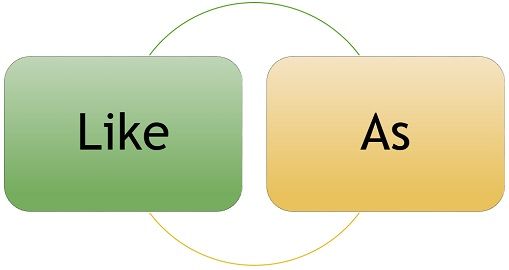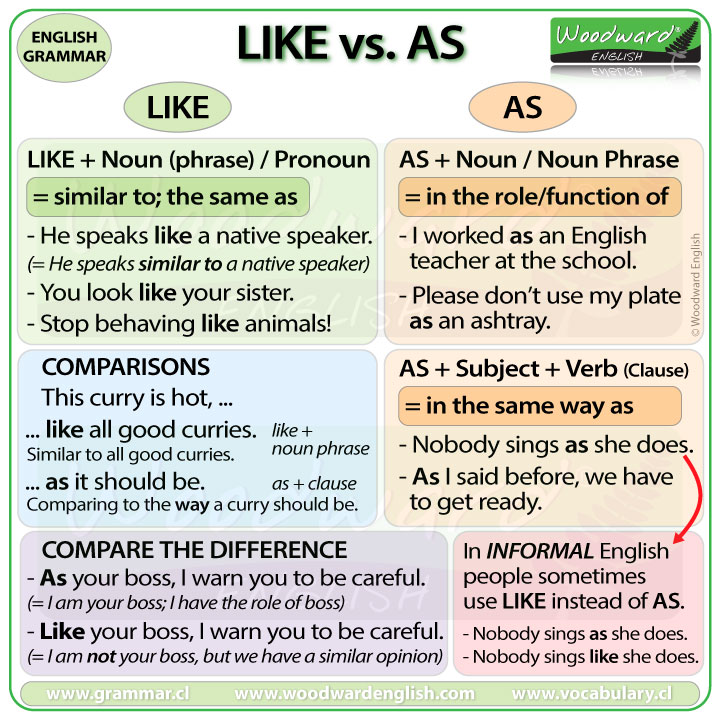
Like and as are words commonly used in English for comparisons. Even though there are subtle differences between them, English speakers use them interchangeably. They are even sometimes misused.
The confusion in using like and as is first caused by translating them to Portuguese, because both of them mean “como”, one word only.
In formal writing, like is used as a preposition, telling location, direction, time or relationship between a noun or a pronoun and another word in a sentence. As is used as a conjunction, joining two clauses (groups of words that must include a subject and a verb), with the bonus that you have a comparison too.
But let me remind you that there are two ways of comparing:
‘more _____ than’ or ‘_____ than’ and ‘as _____ as,’ compare qualities, speed, height, weight, cost, shape
‘like’ and ‘as’ compare things to things, actions to actions
When to use Like
Like compares two things, usually appearance or behavior, meaning ‘similar to.’ That is probably the most common use of like. Like, must always be followed by a noun or a pronoun.
- He looks like Oscar Wilde.
Here, we are comparing he and Oscar Wilde, so like should be used.
- The little girl, like her mother, has bright red hair.
The same goes for this sentence, where we are comparing a mother and daughter.
- She’s a teacher, like me.
Like can also be used to say ‘for example,’ especially when there is a list of things.
- I love sports like tennis and golf.
- I have hobbies like dancing and cycling.

When to use As
As is commonly used to talk about jobs.
- I work as a teacher.
Frequently, as can be replaced by ‘the way‘, ‘in the same way,’ ‘in the same condition.’
- No one makes chocolate cake as my mother does.
Notice how you could replace as with ‘the way’ or ‘in the same way’ and maintain the same meaning.
- No one makes chocolate cake the way my mother does.
As is used to compare verbs (actions). So the conjunction as should be used because there is a subject and a verb (does) after it.
Let’s look at another example.
- He can’t play cricket as he used to.
At first glance, there appears to be no verb after as. However, when speaking, we often leave out verbs that are already implied. The implied verb is play, as in he used to play cricket.
Traditionally, like needs to be followed by a noun. However, in informal English, like can replace as. Some people think this is not correct, but it is common in American English.
- Nobody understands him as I do.
- Nobody understands him like I do.
It is also possible to use as + noun (preposition) meaning ‘in the role/position/function of a person/thing.’
- I’ll dress up as a ghost for Halloween.
- We can use the sofa as a bed.
Now compare the following sentences. Here, the change from as to like changes the meaning.
| As your father, I’ll help you as much as I can. | The speaker is the listener’s father. (it is not a comparison) |
| Like your father, I’ll help you as much as I can. | The speaker is not the father but wishes to act in a similar way to the father. |
Here is a video that reminds us of the use of as for comparing something that is equal (as + adjective + as), and teaches some expressions, like:
- As you know, I’m from Brazil.
- I booked that restaurant, as you suggested.
- As we agreed, I’ll pay you tomorrow.
- You’re late, as usual/always.
- She’s the same age as me.
Next, there is a chart which summarizes this information.

Here is another good lesson and you can now do exercises about as and like.
